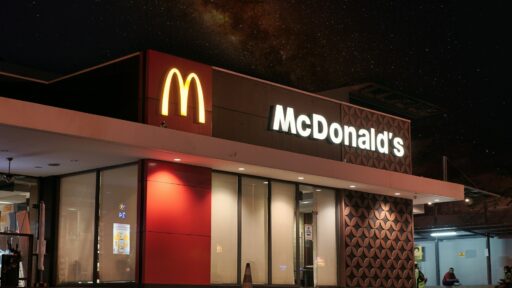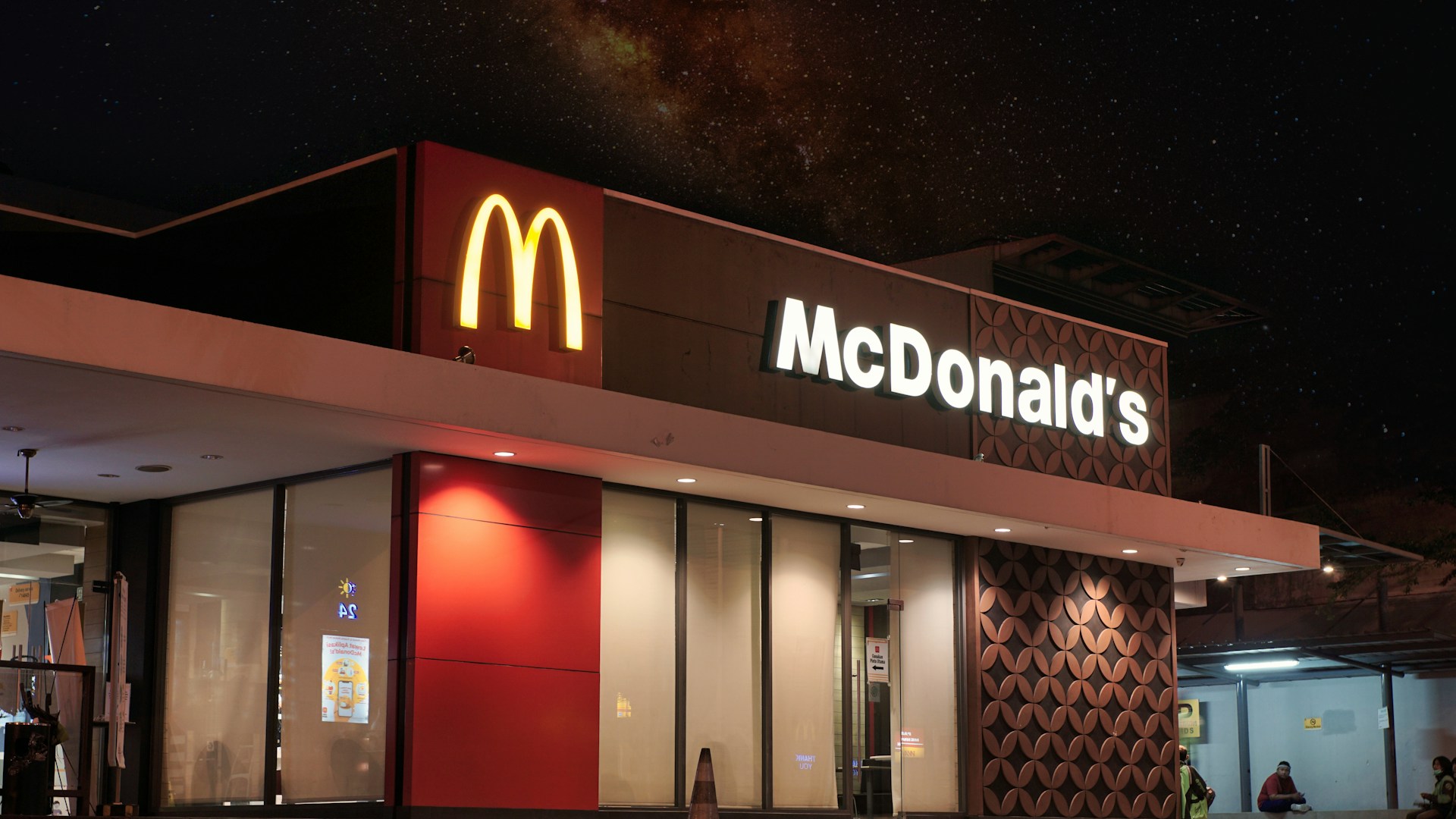McDonald’s, one of the most recognizable global fast-food chains, has been scaling up its environmental and social commitments over the past decade. Its sustainability priorities are captured in the company’s 2023–2024 Purpose & Impact Report, which highlights goals across climate action, responsible sourcing, circularity, and community support. As one of the first quick-service restaurant brands to set science-based targets validated by SBTi, McDonald’s continues to refine its roadmap in alignment with stakeholder expectations and the UN Sustainable Development Goals.
Sources: https://corporate.mcdonalds.com/corpmcd/our-purpose-and-impact.html
Sustainability Strategy and Goals
McDonald’s strategy covers a wide spectrum of sustainability themes embedded across its global operations and supply chains. These include science-aligned climate goals, sustainable agriculture, deforestation-free sourcing, packaging innovation, and employee and community well-being.
- McDonald’s has a validated science-based target aligned to a 1.5˚C pathway for all scopes of emissions
- The company sources 98.8% of its beef and 100% of soy (for chicken feed) from verified deforestation-free supply chains
- 81% of guest packaging globally comes from renewable, recycled, or certified sources
- $100 million committed through Ronald McDonald House Charities over 5 years to support families with hospitalized children
McDonald’s organizes its sustainability strategy across eleven interconnected areas, each aligned to the UN Sustainable Development Goals and validated by its corporate governance framework. The company’s strategy is formalized through the 2023–2024 Purpose & Impact Report and its SBTi-approved climate targets.
Net Zero and Carbon Emissions
McDonald’s aims to achieve net-zero emissions across its entire business by 2050, with science-based interim goals set for 2030. These targets include reductions in restaurant energy use and supplier engagement on agricultural emissions.
- SBTi-approved 1.5˚C emissions reduction pathway
- 15% emissions intensity reduction from 2015 baseline (Scope 1 and 2)
- Renewable energy integration across U.S. and EU restaurant networks
Water Stewardship
Water efficiency is built into McDonald’s restaurant design and agricultural partnerships, especially in water-scarce regions.
- 100% of McDonald’s tea is Rainforest Alliance Certified, ensuring water-conscious farming
- Water risk tools deployed to prioritize mitigation strategies in high-risk sourcing regions
Regenerative Agriculture
McDonald’s supports regenerative pilots for beef and dairy farming in North America and Europe. The focus is on enhancing soil health, biodiversity, and carbon sequestration.
- Pilot farms launched in Canada and the U.S. to scale regenerative practices
- Supplier engagement on climate-smart feed and grazing methods
Deforestation and Biodiversity
The company has made progress in eliminating deforestation from priority supply chains including beef, soy, coffee, and fiber.
- 98.8% of beef and 100% of soy (for chicken feed) sourced from verified deforestation-free origins
- McDonald’s Global Forest Commitment in place since 2015
Packaging and Circular Economy
Packaging innovation is a key component of McDonald’s waste-reduction strategy. Efforts focus on switching to certified, recycled, or renewable materials.
- 81% of guest packaging from preferred sources
- 47.8% reduction in virgin fossil-based plastic in Happy Meal toys since 2018
- Reusable packaging pilots ongoing in select markets like France and the UK
Human Rights and Responsible Sourcing
McDonald’s Human Rights Commitment ensures worker protections across its supply chain, aligned to the UN Guiding Principles on Business and Human Rights.
- Active landscape restoration projects with farmers in Kutai Timur, Indonesia
- Supplier Workplace Accountability audits conducted globally
Nutrition and Health
The company continues to reformulate products and improve transparency to offer healthier, more balanced meals globally.
- 100% of markets provide menu items with less than 400 kcal for Happy Meals
- Reformulation of sauces and dressings to reduce sodium and added sugars
Community and Social Impact
Through Ronald McDonald House Charities (RMHC) and workforce education programs, McDonald’s supports families and frontline employees.
- $100M committed over five years to RMHC
- Archways to Opportunity program expanded to over 65,000 restaurant employees
Governance and Transparency
Sustainability performance is reviewed by the Board of Directors and reported annually through audited disclosures.
- Annual ESG report aligned to GRI and SASB frameworks
- Board-level Sustainability and Corporate Responsibility Committee oversight
Technology and Innovation
Digitalization is helping McDonald’s cut waste and energy use. AI and smart appliances support both sustainability and profitability.
- AI drive-through pilots deployed in the U.S.
- Smart fryers and HVAC systems installed in energy-optimized restaurants
Global Partnerships and Advocacy
McDonald’s is a founding member of the Global Roundtable for Sustainable Beef and supports international collaboration on deforestation and food security.
- Member of the One Planet Business for Biodiversity coalition
- Ongoing participation in EU Packaging and Packaging Waste Regulation working groups
Sources:
https://corporate.mcdonalds.com/content/dam/sites/corp/nfl/pdf/McDonald%E2%80%99s%20Progress%20Summary%202023-2024.pdf
https://sustainabilityreports.com/reports/mcdonalds-corporation-2023-2024-purpose-and-impact-report-pdf/
https://www.smartenergydecisions.com/energy-management/2024/09/16/mcdonalds-corporation-2023-2024-purpose-and-impact-report
https://corporate.mcdonalds.com/corpmcd/our-purpose-and-impact/food-quality-and-sourcing.html
https://www.wsj.com/articles/mcdonalds-gives-its-restaurants-an-ai-makeover-2134f01e
Key Sustainability Innovations and Technologies
To drive environmental performance and business efficiency, McDonald’s has invested in a range of climate-smart technologies and innovations in restaurant operations, packaging, and logistics.
- AI-enabled drive-through systems are being piloted to improve speed and order accuracy
- Smart energy management systems and connected kitchen equipment are reducing energy intensity
- New materials for Happy Meal toys have reduced fossil-fuel plastic usage by 47.8% since 2018
Sources:
https://www.wsj.com/articles/mcdonalds-gives-its-restaurants-an-ai-makeover-2134f01e
https://sustainabilityreports.com/reports/mcdonalds-corporation-2022-2023-purpose-and-impact-report-pdf/
Measurable Impacts
McDonald’s reports consistent progress across many of its ESG targets, particularly in responsible sourcing, circular packaging, and renewable energy adoption.
- 100% cage-free egg sourcing achieved in the U.S. nearly two years ahead of its 2025 goal
- 92% of packaging fiber globally came from recycled or certified sources in 2022
- 15% reduction in absolute emissions intensity per metric ton of food and packaging (Scope 1+2) since 2015
Sources:
https://sustainabilityreports.com/reports/mcdonalds-corporation-2023-2024-purpose-and-impact-report-pdf/
https://corporate.mcdonalds.com/corpmcd/our-purpose-and-impact/our-planet/climate-action.html
Challenges and Areas for Improvement
Despite making significant advances, McDonald’s continues to face major challenges in managing its Scope 3 emissions, packaging waste, and consumer perceptions of sustainability initiatives.
- Packaging changes, like paper straws, have drawn negative consumer feedback due to perceived inconvenience
- The bulk of emissions remains in its supply chain, including agriculture and transportation
- Local sourcing targets are harder to scale in some emerging markets due to limited supplier certifications
Sources:
https://nypost.com/2025/01/01/lifestyle/mcdonalds-sustainable-move-is-ruining-drinks-customers-complain/
https://corporate.mcdonalds.com/corpmcd/our-purpose-and-impact/our-planet/climate-action.html
Future Plans and Long-Term Goals
Looking ahead, McDonald’s is focused on embedding sustainability more deeply into its operating model, supply chain, and brand identity. The company aims to decarbonize its restaurant footprint, scale regenerative agriculture, and advance circularity in materials and packaging. A key component of its forward strategy involves expanding partnerships with suppliers and regional communities to improve environmental resilience across its value chain.
- McDonald’s aims to achieve net zero greenhouse gas emissions across its entire business by 2050, with interim 2030 targets validated by the Science Based Targets initiative
- 100% of guest packaging is targeted to come from renewable, recycled, or certified sources by 2025
- In the U.S., the company is on track to meet its goal of 100% cage-free eggs by 2025, reaching nearly full compliance in 2023
- Expansion of regenerative farming pilot programs in North America and Europe, with a focus on beef and dairy value chains
- Investments continue in smart kitchen equipment and AI-powered restaurant operations to enhance energy efficiency and customer experience
From a strategic perspective, McDonald’s continues to demonstrate maturity in ESG integration across a complex global supply chain. Its science-based targets, packaging redesigns, and regenerative sourcing pilots place it ahead of several foodservice peers. However, Scope 3 emissions and plastic waste remain areas where industry-wide collaboration is essential, especially in emerging markets where regulatory support varies. For companies navigating similar challenges, McDonald’s example illustrates the value of setting ambitious goals while investing in scalable, tech-enabled solutions to close the gap between intention and impact.
Sources:
https://corporate.mcdonalds.com/corpmcd/our-purpose-and-impact/our-planet/climate-action.html
https://corporate.mcdonalds.com/content/dam/sites/corp/nfl/pdf/McDonald%E2%80%99s%20Progress%20Summary%202023-2024.pdf
https://sustainabilityreports.com/reports/mcdonalds-corporation-2023-2024-purpose-and-impact-report-pdf/
https://www.smartenergydecisions.com/energy-management/2024/09/16/mcdonalds-corporation-2023-2024-purpose-and-impact-report
https://www.wsj.com/articles/mcdonalds-gives-its-restaurants-an-ai-makeover-2134f01e






